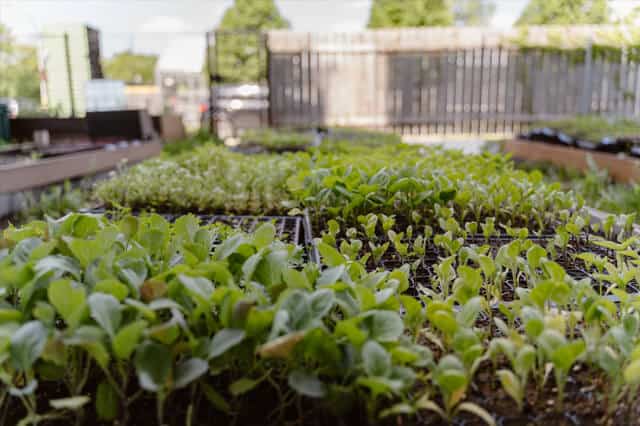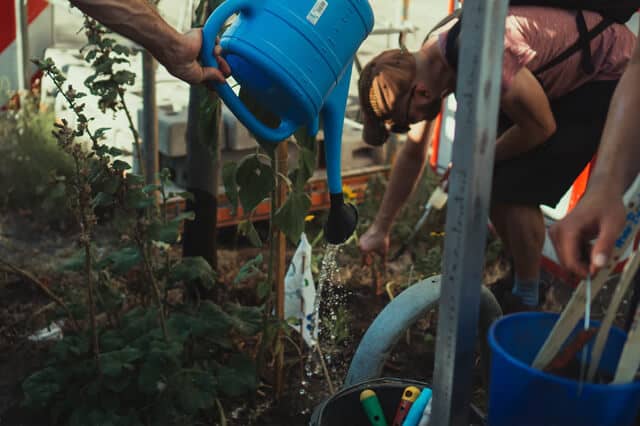Do you live in a city or a densely populated area and have little to no land? It is often assumed that farming requires lots of land in the country, but as cities have filled up, people have turned to urban farming to fulfill their need for fresh food as well as supply the needs of their community. Urban farming is simply described as growing food in a city or heavily populated area.
What is Urban Farming?

The term ‘urban farming’ denotes that there is the sale of items that are grown. This is different from other commonly confused types of farming, such as community gardens, subsistence farming, or homesteading. Although it does have the element of profit, some urban farmers have small simple farms while some have large-scale productions.
Urban farming can include all types of crops from fruits and vegetables, eggs, flowers, and even beekeepers.
What are the Benefits of Urban Farming?

Urban zones have long suffered from a lack of fresh and local produce, commonly called food deserts. These deserts have negatively affected the health and wellness of the people. Urban farming provides multiple benefits to not only the residents of urban areas but to the community as a whole.
- Accessibility to fresh, local food – The most obvious benefit of urban farming is the ability to provide fresh, local food to the people of urban areas. With high-density populations and physical distance from farms, urban zones lack the availability of high-quality crops and the quantity to properly feed the people. On the most basic level, urban farming increases the accessibility to healthy, affordable food.
- Healthier population – Urban dwellers already are impacted by the environmental factors of living in highly dense areas, including pollution, less access to nature, and increased noise. Urban farming provides direct access to healthy food options, positively affecting the health of the community. With shorter transport times to consumers, local food retains more vitamins and minerals which leads to healthier people. It also reduces the strain of traditional agriculture as it requires less water and less use of pesticides and chemical fertilizers.
- Boosts local economy – Local food systems like urban farming builds and sustains money in the local community. As schools, restaurants and other businesses access the food grown from urban farming, the money stays within the community. Urban farms provide jobs for residents. Additionally, it encourages the growth of other related businesses to help support and sustain the urban farming network.
- Increased education around food – Urban farming allows people to see and experience the growth process of food. It also allows people to see their farmers up close. To be able to see your food from seed to plate is a powerful educational lesson for all ages. The increased education benefits the community and the younger generations, which correlates to healthier decisions around food.
How to Start

The benefits of urban farming are obvious, but getting your urban farm up and running requires a bit of planning. Here are a few things to consider.
Ensure you have proper training – Farming of any type requires a good amount of background knowledge. If you are not already knowledgeable in farming techniques, get some more education under your belt. Urban farming has some unique specifics. However, even if you do have a solid knowledge of farming, be ready to learn about these things. Join a farming group, local school, or even connect with another urban farm to gain the knowledge you need.
Determine your customer – Because benefits of urban farming involves profit, determine the size and scale of your business as well as who your customers will be. Consider local farmers markets, restaurants, grocery stores, and food groups as potential customers.
Set up your business – Prepare for your urban farm as you would prepare for the setup of any other business. Because you are selling your goods, ensure that you have all the correct licenses to operate. Additionally, check on any required insurance and permits through your local city. Setting your farm up properly from the beginning will protect you from potential risks in the future.
Find out what the need is – The beauty of local food is that you can tap into your community and find out what the people need and want and what is lacking. Finding a need and meeting it will always set you up for success. Oftentimes, what is most profitable is not what is most needed in that community. Above all, weigh the need for profit while balancing the need to provide what your community needs.
Pick the perfect spot – Urban farming comes in all shapes in sizes. If you are growing crops, decide on where you will grow your crops. Due to the nature of an urban landscape, be creative and consider non-traditional areas to grow food. Consider all areas of land such as backyard gardens, school gardens, rooftop gardens, indoor gardens, and vertical gardens. Keep in mind what is around your potential growing space, such as other businesses or increased pollution, or the use of toxic chemicals. Take into account how these things could potentially negatively impact your farm.
Test your soil – Testing the soil to ensure it is capable of growing food is essential to the success of your farm is a small but important step. Nutrient deficient soil will lead to unhealthy plants and loss of profit.
Create a watering plan – Make sure to plan out how you will water your farm. Depending on where your farm is, consider what irrigation system makes the most sense for your space. In more populated spaces, consider the areas around the farm and how your watering may impact them.
Get a marketing plan – Marketing may not be your forte, but some marketing skills are required to make your farm profitable. If you aren’t up for the challenge, get marketing help. Connect with someone who can help you create a solid plan to get your crops to your target customers. The beautiful thing about urban farming is your target customers are already in your community. As a result, you don’t have to look far. Get out there and get to know them.
Have fun enriching your community – This is the most rewarding benefits of urban farming. Serving your community by supplying it with food that it needs and creating jobs enriches your community. Think of all the other ways your farm can bring your community together.

